Mothers of Palestine | فلسطين
While a great part of the world is celebrating “Mothers Day”, special attention for the women of Palestine for they have not much to celebrate. In stead of receiving flowers and gifts of their children…. Palestinian women put flowers on the graves of their children. Even on Mother’s Day.
This page is a tribute to the Mothers of Palestine, never giving up, enduring occupation, suffering the loss of their husbands, children, killed by occupation. I Salute the Lionesses of Falasteen. A compilation of photography of brave women who have to endure more than nations in a lifetime. May Allah Subhana wa Ta’ ala ease it for them and increase their blessings, for dunya and ‘Akheera. Allahumma Ameen ya Rabbil ‘Alameen.
This page is a tribute to the Mothers of Palestine, never giving up, enduring occupation, suffering the loss of their husbands, children, killed by occupation. I Salute the Lionesses of Falasteen. A compilation of photography of brave women who have to endure more than nations in a lifetime. May Allah Subhana wa Ta’ ala ease it for them and increase their blessings, for dunya and ‘Akheera. Allahumma Ameen ya Rabbil ‘Alameen.
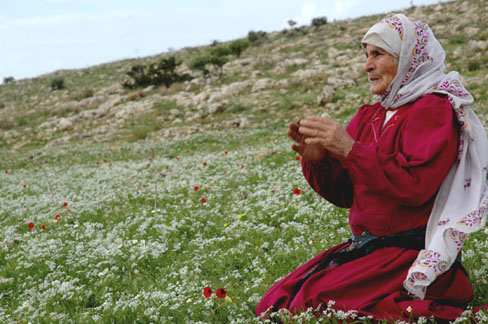
A Mother of Palestine

Palestinian Mother Harvesting Olives

Mourning Mothers of Palestine

Palestinian Woman Harvesting

Palestinian Woman at a Separation Fence

Palestinian women, separated from their husbands who wait in other rows, at the Israeli Gilo Checkpoint

Palestinian Mother with a Palestinian Flag

A Mother of Palestine wearing beautiful traditional Palestinian tatreez dress

Palestinian Mother, sitting beside the rubble of her destroyed house | Jan 9, 2011 | Gaza

No one has more courage than... a Palestinian Mother! | Activestills.org

Palestinian Mother ... Resisting

Palestinian Mothers mourning their sons, husbands killed by Occupation

- Palestinian Woman holding a Stone

- Palestinian woman crying aside her destroyed house
 Palestinian woman in the endless waiting at a checkpoint
Palestinian woman in the endless waiting at a checkpoint

Palestinian woman selling vegetables

Palestinian Woman being watched by an Israeli patrol unit

Palestinian woman sitting and crying, in the rubble of her House | Gaza Cast Lead War 2008-2009

Palestinian Mothers at the Apartheid Wall | Jan 2011
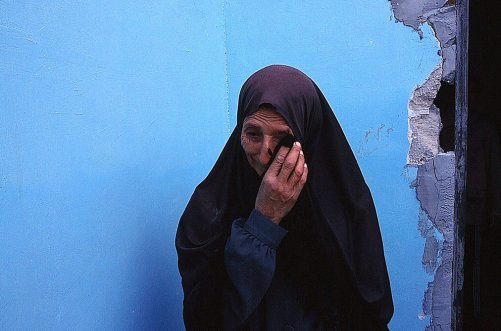
Crying, a Mother from Gaza
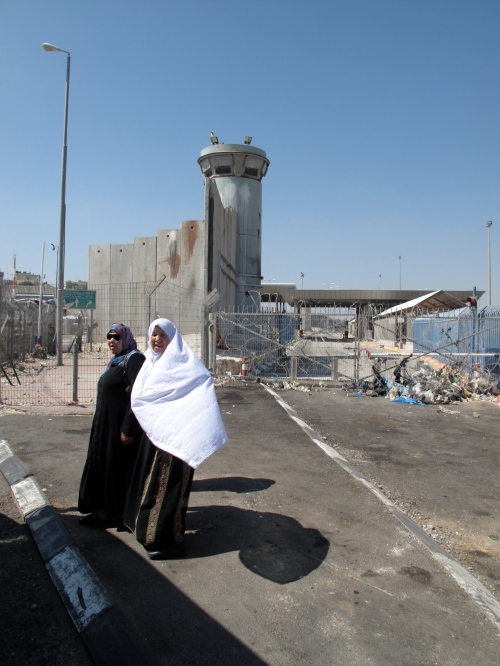
Palestinian Women at the Separation Barrier
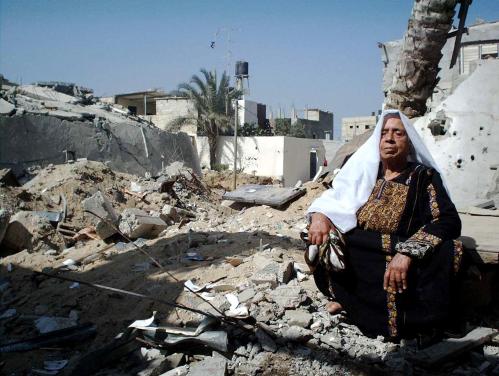
A mother from Gaza, Everything they destroyed.. but they will never be able to destroy her Pride

Mothers in Gaza, mourning their children, killed by Israeli Attacks during Cast Lead War on Gaza | Dec 29, 2008
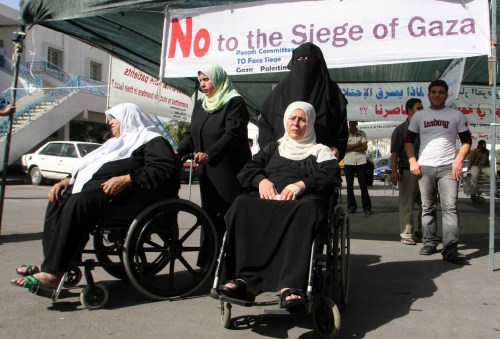
Palestinian Mother & Cancer Patient, like many suffering from Cancer in Gaza, denied treatment and endure violations of Human Rights to receive proper care due to Israel's cruel blockade of Gaza
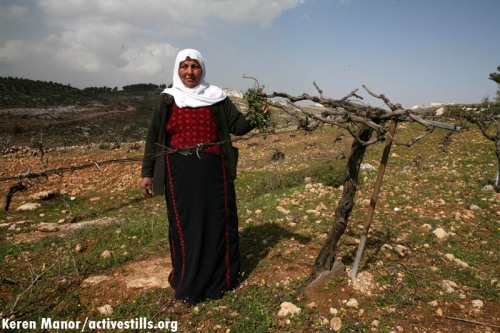
Palestinian woman at an Olive tree yard

Unfortunately a famous pictures, but it displays the despair, the continuous violence, Palestinians have to go through. A Palestinian women, holding on to her olive tree, destroyed by the Israeli Occupying Forces

Palestinian women sit in the rubble of Jabaliya Camp after Israel attacks and devastation | Jan 18, 2009 | Gaza

Women and mothers of Palestine, protesting their (often without trial) emprisoned husbands, sons and even daughters


Old woman, crying...

And a woman with children in Gaza. In the background, visible devastation of the attack of december 2008. | March 2009

Palestinian woman searches her belongings after Israel attacked and destroyed her house in Rafah | Jan 10, 2009

Palestinian Woman in Jenin, in the background the remains of that which was their "home"... Jenin refugee Camp

Women waiting allowed to harvest of their own lands

A Palestinian mother and her child just past one of the over 600 checkpoints which restrict the movement of Palestinians

Palestinian woman holding a portrait of a loved one as she takes part in a protest in Gaza for release of Palestinian Prisoners in Israeli Jails | Oct 5, 2009

Palestinian Women in al-Quds

Palestinian woman making a Tabon
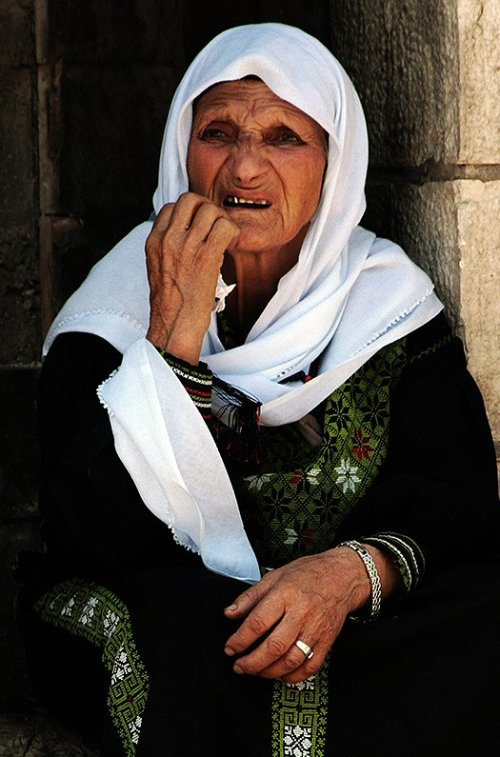
"And We have enjoined upon man, to his parents, good treatment. His mother carried him with hardship and gave birth to him with hardship..." ( Quran 46:15 )

A Palestinian old woman of the West Bank village of Ras Tira collaps when seeing the destroyed trees of her family on 07.04.2009. The Wall is being built next to Ras Tira; a village whose inhabitants are already living in a enclave. Around 50 olive trees have been destroyed in one day. Photo by: Anne Paq/Activestills.org

A Palestinian old woman of the West Bank village of Ras Tira looks at the destroyed trees of her family on 07.04.2009. The Wall is being built next to Ras Tira; a village whose inhabitants are already living in a enclave. Around 50 olive trees have been destroyed in one day. Photo by: Anne Paq/Activestills.org

A Palestinian woman lies in side an ambulance after she was injured by Israeli soliders who came to destory her field near Hebron, on October 29, 2009. Israeli army contractors destroyed the filed and removed the irrigation system near the Jewish settlement of Kiryat Arba. The Israeli army claims the field poses a security threat because it is too close to the settlement. Photo by: Oren Ziv/ Activestills.org

A Palestinian woman, every day reality in the West Bank, being harrassed, humiliated by jewish colonists... Welcome to Palestine reality and colonial racism, she has to undergo it as well...

Palestinian women and children, of the heavily destroyed Ezbet Abed Rabbo area of the northern Gaza Strip refugee camp of Jabalia wave national flags as they gather to receive UN Secretary General Ban Ki-moon at the camp on March 21, 2010.

These women deserve much better... Woman in Gaza on Jan 1, 2009, after Israel destroyed their home and belongings...

A Palestinian mother, shouts, as she sits in her damaged house after Israeli troops pulled out of the northern Gaza Strip

A Palestinian woman sits in front of houses destroyed during the 3 weeks taking Israel's offensive on Gaza in Jabalya in the northern Gaza Strip January 19, 2009

A Palestinian woman, who is a member of al-Athamna family, prepares lunch near the ruins of her destroyed house in Gaza January 27, 2009. Majdi al-Athamna's house, three neighbouring buildings which belonged to his sons and every other property along a kilometre (half-mile) stretch in Abed Rabbo, a village on the outskirts of the city of Gaza, were levelled by Israeli forces.. REUTERS/Mohammed Salem (GAZA)

A wounded Palestinian woman lies with her baby at the Al-Shifa hospital on December 28, 2008 in Gaza City, Gaza. On the second day of cross-border conflict, Israel's air force continued to launch attacks along the Gaza Strip, destroying many buildings belonging to Hamas, including holy mosques, civilian homes and vehicles, work shops, police compounds and a prison, increasing the number of Palestians killed to over 270. -Photo by Abid Katib/Getty Images

At the end of May 2010, 110 of 470 medicines considered essential, such as chemotherapy and haemophilia drugs, were unavailable in Gaza. When chemotherapy is interrupted, the chances of success drop dramatically, even if another painful round of treatment is initiated. Haemophilia patients face life-threatening haemorrhages when compounds such as Factor VIII and IX are not available. © ICRC / ICRC Cécilia Goin / V-P-IL-E-01977H / www.icrc.org

Some rally, some protest and even some women resist. One of the first women of resistance.... Leila Khaled. A woman of Moqawama

Even nowadays, women resist the cruelties of occupation by Israel. Islamic Jihad women of resistance run drills during their first training session in the Gaza Strip | Nov. 26, 2009

And as Occupation's aggression takes their sons, so life goes on, and sons get married. Here a mother in front of grooms, sided by their sisters, all wounded or handicapped by the offensive of Gaza war Cast Lead. Married during an event organized by the Islamic Association | Oct 30, 2010

Palestinian mothers and relatives of grooms dancing while spray bubbles during a mass wedding ceremony in Gaza City, Saturday, Oct. 30, 2010

A Gazan woman, harvesting flowers. Due to Israeli siege, many of the harvested flowers will be destroyed, or even used as food for the sheep for their harsh labour ends in impossibilities to export | 2010

A woman holds her child in in front of her destroyed home on January 23, 2009 in a suburb in Gaza City, Gaza Strip. Residents of Gaza are still suffering from severe food and water shortages. According to reports, 13 Israelis and over 1300 Palestinians were killed

A Palestinian woman sits near her wounded grandson at Gaza City's al-Shifa hospital on January 5, 2009 while battles between Israeli soldiers and Hamas fighters continue in Gaza. Israeli strikes on Gaza killed another 14 Palestinians, including five children, today, the tenth day of Israel's massive offensive on the Hamas-run enclave, medics said. At least 517 Palestinians, including 87 children, have been killed and more than 2,500 wounded since Israel unleashed its "Operation Cast Lead" on December 27.

Not only flowers get destroyed, also homes. Here, a woman overlooking what is left of her by Occupation Forces demolished house. Ethnic cleansing, an every day reality in Palestine

Palestinian women walk past a destroyed house in Jabalia in the northern Gaza Strip on January 21, 2009. European Union nations will press Israel to open the war-torn Gaza Strip to humanitarian aid and consolidate a ceasefire that ended the Jewish state's war on Hamas, officials in Brussels said. The last Israeli soldier withdrew from Gaza on January 21, the fourth day of a ceasefire that ended a three-week blitz on the Islamic Hamas movement, leaving 1,300 Palestinians dead and a trail of devastation. Photo by PATRICK BAZ/AFP/Getty Images

A wounded Palestinian woman is pictured in Rafah in the southern Gaza Strip on December 31, 2008. Two people died on January 1 in New Year Israeli air strikes on the Gaza Strip, raising the toll since Israeli military operations began on December 27, 2008 to 397, according to the head of the territory's emergency services

Israeli soldiers and their graffitti on a wall in Gaza, where a woman bled to death PDR graffitti where a woman bled to death...

And if not destroyed, Jewish Colonists just take over your house. Here, a Palestinian woman sitting besides what was her house, now inside living Jewish settlers and her child sleeping on a matrass on the ground... in open air

A Palestinian woman sits in front of furniture hours after her house was demolished by Israeli authorities in the east Jerusalem neighborhood of Jabel Mukaber, Wednesday, April 22, 2009. The U.N.'s top Mideast envoy Robert Serry inspected the ruins of a Palestinian home in Jerusalem, demolished just hours earlier by Israel, and said witnessing the distress of the now homeless family of seven was "pretty shocking."

A Palestinian woman, standing by the remains of her house destroyed by Israel. In the background an Israeli (illegal by International Law) settlement. Ethnic cleansing in process...

In Silwan, a neighbourhood in Jerusalem and a hotspot for illegal ethnic cleansing, a Palestinian woman holding an eviction order to leave her house. Under the 4th Geneva Convention it is forbidden for an occupier to transfer it's own people into occupied areas. But in Palestine, no law is to effectuate for Palestinians. She has to leave her house...

Not only for housing of Colonists, but Palestinian Families also have to move out for the sake of the apartheidswall, the eternal "security" excuse of Israel to annexate land and properties. In this picture a Palestinian woman looks at the bulldozer working in front of her house in the West Bank city of Beit Jala, 03.03.2010. The Wall will be built just in front of the Palestinian houses. A group of around 30 Palestinians, Israelis and internationals held an action to stop the work of the bulldozers, which have started to uproot trees and level lands on 02.02.2010. As soon as the group reached the land, the Israeli soldiers violently pushed them up. The group then sat down and refused to move further, but the Israeli army used force to push them out the area. 300 dunums owned by 35 families are subject to confiscation, for the purpose of buidling the Wall. Beit Jala has already lost three quarters of its lands because of the building of the road 60 and the Gilo settlement.

Women of the Al Qawasmi family praying for their loved and lost one, Omar Salim Al Qawasmi, shot several times, point blank at short range, while sleeping in his bed. Assassinated by Israeli Occupation Forces on Jan 7, 2011

Women and relatives mourning for Jawaher Abu Rahma. The first Shaheeda of 2011. Killed of the injuries of Chemical CS Tear Gas used by Israeli Occupation Forces on January 1st, 2011

Every day a funeral in Palestine. Dec 24, 2010. Another victim of Occupation has died, another mother lost her son.

Women mourning about their sons and nephews. September 24, 2010. Israeli Occupation Forces shot several Gaza Fishermen to death while trying to earn their living on sea, catching fish...

Cast Lead. The Genocide on Gaza which cost the lives of over 1400 Palestinians, among them a lot of children. Here, a mother with her child. No mother in the world wants to survive her own child. She has to. As many Palestinian Mothers do. When will there be an end to these atrocities...

Another child, killed by the abhorrent crimes of Israel during Cast Lead. A Future destroyed, another child martyr and another mother's heart broken for a lifetime
How many more dead corpses of Palestinians does the international community need to see in order to act? How much more, do Palestinians and mothers need to suffer. How many more women, need to loose their children, husbands and even.. their own lives.How many more cruelties and violations of Human Rights, Regulations and International Law will be needed to intervene so this ongoing warcrime is being stopped once and for all?
What does Islam say about “mothers”?
This is one of the most convincing things about Islam – the treatment of women in general and especially the high position mothers hold in Islam.
Amongst the clearest examples of Islam’s honoring women is the great status of the mother in Islam. Islam commands kindness, respect and obedience to parents and specifically emphasizes and gives preference to the mother as shall be shown in this article. Islam raises parents to a status greater than that found in any other religion or ideology.
Amongst the clearest examples of Islam’s honoring women is the great status of the mother in Islam. Islam commands kindness, respect and obedience to parents and specifically emphasizes and gives preference to the mother as shall be shown in this article. Islam raises parents to a status greater than that found in any other religion or ideology.
The command to be good to one’s parents begins right from the Qur’an. Allah says:
“Worship God and join not any partners with Him; and be kind to your parents…”
[Noble Quran 4:36]
The mention of servitude to parents follows immediately after servitude to God. This is repeated throughout the Qur’an.
“Your Lord has decreed that you worship none but Him and that you be kind to parents. Whether one or both of them attain old age in your life, say not to them a word of contempt, nor repel them, but address them in terms of honor. And out of kindness, lower to them the wing of humility and say, “My Lord! Bestow on them Your Mercy even as they cherished me in childhood.”
[Noble Quran 17:23-24]
The great scholar, Abu al-Faraj Ibn Al-Jawzî (d. 1201CE) explained:
To be kind to one’s parents is: to obey them when they order you to do something, unless it is something which Allah has forbidden; to give priority to their orders over voluntary acts of worship; to abstain from that which they forbid you to do; to provide for them; to serve them; to approach them with gentle humility and mercy; not to raise your voice in front of them; nor to fix your glance on them; nor to call them by their names; and to be patient with them. (Ibn al-Jawzî, Birr al-Wâlidayn)
The Qur’an emphasizes the great struggles the mother goes through for her child, to highlight the need for one to reciprocate their parents sacrifice for them:
“And We have enjoined on man [to be good] to his parents: in travail upon travail did his mother bear him and his weaning was over two years. Be thankful to Me and to your parents, unto Me is the final destination.”
[Noble Quran 31:14]
The renowned exegete, Shaykh Abdur-Rahman As-Sa’di (d. 1956), says about this verse:
{And to your parents} meaning, be kind to your parents, shower on them love, affection and piety, both in words and deeds, treat them with tender humility, provide for them and never harm them verbally nor physically. [...] Then, Allah mentions the reason why we should be kind to our parents, when He says {His mother bore him in travail upon travail}, that is, the mother bore constant suffering; in pain and hardship from the first moment she felt the child moving in her womb to the worst pangs during the time of delivery. And {his weaning is for two years}, that is, during these two years the mother breast-feeds her child and looks after him/her. So after all the years of suffering, hardship, love and care, could we not, at least, compensate our mothers for what they have done for us and pay them back their rights? (Taysîr al-Karîm ar-Rahmân fî Tafsîr al-Kalâm al-Manân)
The Qur’an repeats its mention of the struggles of the mother in yet another passage:
“And We have enjoined upon man, to his parents, good treatment. His mother carried him with hardship and gave birth to him with hardship, and his gestation and weaning [period] is thirty months. [He grows] until, when he reaches maturity and reaches [the age of] forty years, he says, “My Lord, enable me to be grateful for Your favor which You have bestowed upon me and upon my parents and to work righteousness of which You will approve and make righteous for me my offspring. Indeed, I have repented to You, and indeed, I am of the Muslims.”
[Noble Quran 46:15]
In connection to this passage, the late Grand Mufti of Pakistan, Shaykh Muhammad Shafy (d. 1976) wrote:
Mother has more rights than father
Although the first part of this verse is a command to do good to both the parents, the second sentence refers only to the hardships suffered by the mother, because they are unavoidable, and no child can be born without them. Every mother has to go through the problems of pregnancy and severe pains of delivery. As against this, it is not necessary for a father that he suffers any hardship in bringing up and educating the child, if he can afford to pay somebody else for these services. This is why the Prophet (peace and blessings be upon him) has given more rights to the mother than anybody else.
According to a hadîth he has said,
“Do good to and serve your mother, then your mother, then your mother, then your father, then the near relatives and then those who come after them.”
[Mazhari]“And his carrying and his weaning is in thirty months”
[Noble Quran 46:15]
This sentence too describes the hardships suffered by the mother for her baby. It points out that even after suffering hardships during pregnancy and the severe labor pains, the mother does not get respite from toils, because the natural food of the infants is in her breasts, and she has to suckle them. (Shafy, Ma’âriful Qur’ân [Eng. trans.], vol. 7, pp. 795-796)
The Prophet Muhammad (peace and blessings be upon him) continually used to remind his followers of the status of the mother and the obligation of being good to one’s parents. The following narration is a beautiful example of the noble position of the mother:
A man came to the Prophet and said:
O Messenger of Allah! Who from amongst mankind warrants the best companionship from me? He replied:
“Your mother.” The man asked: Then who? So he replied: “Your mother.” The man then asked: Then who? So the Prophet replied again: “Your mother.” The man then asked: Then who? So he replied: “Then your father.”
(Sahîh Bukhârî 5971 and Sahîh Muslim 7/2)
Commenting on this hadith, Shaykh Muhammad Ali Al-Hashimi notes:
This hadith confirms that the Prophet (peace and blessings be upon him) gave precedence to kind treatment of one’s mother over kind treatment of one’s father (Al-Hashimi, The Ideal Muslimah, IIPH 2005, p. 165)
Likewise, the late Grand Mufti of Saudi Arabia, Shaykh Abdul-Azîz Ibn Bâz (d. 1999) comments on this hadith saying:
So this necessitates that the mother is given three times the like of kindness and good treatment than the father. (Majmoo’ Fataawaa wa Maqalat Mutanawwi’ah)
He also writes:
The secret of her importance lies in the tremendous burden and responsibility that is placed upon her, and the difficulties that she has to shoulder – responsibilities and difficulties some of which not even a man bears. This is why from the most important obligations upon a person is to show gratitude to the mother, and kindness and good companionship with her. And in this matter, she is to be given precedence over and above the father.[...] And I have no doubt that my mother – may Allah shower His mercy upon her – had a tremendous effect upon me, in encouraging me to study; and she assisted me in it. May Allah greatly increase her reward and reward her with the best of rewards for what she did for me. (Majmoo’ Fatawa wa Maqalat Mutanawwi’ah)
The secret of her importance lies in the tremendous burden and responsibility that is placed upon her, and the difficulties that she has to shoulder – responsibilities and difficulties some of which not even a man bears. This is why from the most important obligations upon a person is to show gratitude to the mother, and kindness and good companionship with her. And in this matter, she is to be given precedence over and above the father.[...] And I have no doubt that my mother – may Allah shower His mercy upon her – had a tremendous effect upon me, in encouraging me to study; and she assisted me in it. May Allah greatly increase her reward and reward her with the best of rewards for what she did for me. (Majmoo’ Fatawa wa Maqalat Mutanawwi’ah)
The Prophet Muhammad (peace and blessings be upon him) also said in a famous narration:
‘Paradise lies at the feet of your mother’
[Musnad Ahmad, Sunan An-Nasâ'i, Sunan Ibn Mâjah]
What can be greater evidence of honoring women than this? Islam has effectively placed the ultimate reward for human beings in their devotion to their mothers.
Shaykh Ibrahîm Ibn Sâlih Al-Mahmud writes:
Treat your mother with the best companionship, then your father; because paradise is under the mother’s feet. Never disobey your parents, nor make them angry, otherwise you will live a miserable life in this world and the hereafter, and your children will treat you likewise. Ask your parents gently if you need something. Always thank them if they give it to you, and excuse them if they do not, and never insist on a matter if they refuse to give you something. (Al-Mahmoud, How to be kind to your Parents, p.40)
It is related from Talhah ibn Mu’âwiyah as-Salamî who said:
I came to the Prophet and said, “O Messenger of Allah, I want to perform Jihad in the way of Allah. He asked, “Is your mother alive?” I replied, “Yes.” The Prophet then said: “Cling to her feet, because paradise is there.”
(at-Tabarânî).
Shaykh Nidhaam Sakkijihaa comments:
Cling to her feet means to submit yourself to her, be close to her, protect her, serve her because in this is Paradise and with her satisfaction you will enjoy the good blessings of Allah. (Sakkijihaa, Honoring the Parents, p. 52)
Cling to her feet means to submit yourself to her, be close to her, protect her, serve her because in this is Paradise and with her satisfaction you will enjoy the good blessings of Allah. (Sakkijihaa, Honoring the Parents, p. 52)
The Prophet Muhammad (peace and blessings be upon him) showed us the importance of serving one’s parents in the following narration reported by Abdullah Ibn Mas’ud:
I asked the Prophet, ‘O Messenger of Allah, what is the best deed?’ He replied ‘Prayer offered on time.’ I asked, ‘What is next in goodness?’ He replied, ‘To be dutiful and kind to one’s parents.’ I further asked, ‘What is next in goodness?’ He replied, ‘Jihad in the Allah’s cause.
[Sahîh Bukhârî, Sahîh Muslim]
Just as the Prophet said that kindness to one’s parents was of the best deeds, he also said that disobedience to them was amongst the major sins:
“The greatest sins are to associate partners in worship with Allah, to be undutiful or unkind to one’s parents, to kill a soul forbidden by Allah and to bear false witness.”
[Sahîh Bukhârî]
[Sahîh Bukhârî]
Even after the Prophet Muhammad (peace and blessings be upon him), the Muslim scholars continued to stress the importance of being dutiful to one’s mother. By examining the conduct and teachings of the early Muslim scholars, one may see how the direct recipients of the Islamic message understood the command to be dutiful to one’s parents. Their behavior towards their parents shows Muslims how one is to implement the teachings of the Prophet on honoring parents
Abdullah Ibn Abbâs (d. 687CE), a companions of the Prophet and a great scholar of Islam, considered kind treatment of one’s mother to be the best deed for strengthening or rectifying one’s relation with God. He said:
I know of no other deed that brings people closer to Allah than kind treatment and respect towards one’s mother.
[Al-Adab al-Mufrad Bukhârî 1/45]
An even more powerful example is found in the statement of another one of the Prophet’s companions, Abdullah Ibn ‘Umar (d. 692CE), who was also a great scholar of Islam. It has been related that:
Abdullah Ibn ‘Umar saw a Yemeni man performing Tawâf (circumambulating the Ka’bah) while carrying his mother on his back. This man said to Abdullah Ibn ‘Umar, “I am like a tame camel for her! I have carried her more than she carried me. Do you think I have paid her back, O Ibn ‘Umar?” Abdullah Ibn ‘Umar replied, “No, not even one contraction!!”
[Al-Adab al-Mufrad Bukhârî 1/62]
SubhânAllah (Glory be to God)! The efforts of a man who carries his mother on his back while performing tawâf cannot even repay his mother for a single contraction that she went through for him. Wise indeed was Ibn ‘Umar’s reply to this man to show him how massively indebted he was to his mother. This is the tremendous value and prestigious position of mothers in Islam!
Yet another example is found in the following prophecy of Prophet Muhammad (peace and blessings be upon him):
There will come to you with reinforcements from Yemen a man called Uways ibn ‘Âmir of the clan of Murâd from the tribe of Qaran. He had leprosy but has been cured of it except for a spot the size of a coin. He has a mother and he has always treated her with kindness and respect. If he prays to Allah, Allah will fulfill his wish. If you can ask him to pray for forgiveness for you, then do so.
[Sahîh Muslim 16/95]
Indeed, later on ‘Umar ibn al-Khattâb met Uways who was exactly as the Prophet described, and upon ‘Umar’s request Uways prayed for him. Commenting on this narration, Shaykh Muhammad Ali Al-Hashimî writes:
What a high status Uways reached by virtue of his kindness and respect towards his mother, so that the Prophet recommended his Sahabah [companions] to seek him out and ask him to pray for them!
All of this indicates the high status to which Islam has raised the position of motherhood, and given the mother precedence over the father. At the same time, Islam has given importance to both parents, and has enjoined kindness and respect to both. (Al-Hashimi, The Ideal Muslimah, IIPH 2005, p. 167)
So great was the Islamic emphasis on parents, that the Muslims considered a great opportunity to attain paradise in service to one’s mother. Iyâs Ibn Mu’âwiyah was a famous Islamic scholar from the second generation of Muslims. When his mother died, Iyâs Ibn Mu’âwiyah cried. He was asked, “Why do you cry?” He said, “I used to have two gates open to Paradise, now one of them is closed.”
Zayn al-’Abidîn (d. 713CE) was the great grandson of the Prophet Muhammad (peace and blessings be upon him) and also a renowned scholar.
He used to treat his mother with so much kindness and love as seen in the following narration:
Once he was asked, ‘You are the most kind person to his mother, yet we have never seen you eating with her from a single dish.’ He replied, ‘I fear that my hand would take the what her eyes have already seen in the dish, and then I would be disobeying her’.[At-Tartushi, Birr al-Wâlidayn]
In other words, he was so careful not to disobey his mother that he would even avoid eating out of the same plate as her; He thought that she would see a morsel and intend to take it, but before she did he might unknowingly take that same morsel and eat it. This is how careful he was to obey his mother in the most minute details.
Another early Islamic scholar, Sa’îd Ibn Al-Musayyib (d. 709CE), was asked about the meaning of the verse “but address them in terms of honor” (17:23). Sa’îd Ibn Al-Musayyib replied:
It means that you should address them as a servant addresses his master.
Muhammad Ibn Sirîn (d. 729CE) used to speak to his mother in a very soft voice, out of respect for her. He was also often seen in the company of his mother and looking after her.(Ibn al-Jawzî, Birr al-Wâlidayn)
All that has preceded shows how the status of mothers – and consequently that of women – is elevated to the highest position in Islam. The honor Islam has given to mothers is beyond that found in any other religion, ideology or culture. This is clear proof of the lofty status of Muslim Women.
Women – is elevated to the highest position in Islam. The honor Islam has given to mothers is beyond that found in any other religion, ideology or culture. This is clear proof of the lofty status of Muslim Women.
~ Reposted by Sofia Smith - brought to my attention again by @hadearkandil
~ Reposted by Sofia Smith - brought to my attention again by @hadearkandil
















































No comments:
Post a Comment